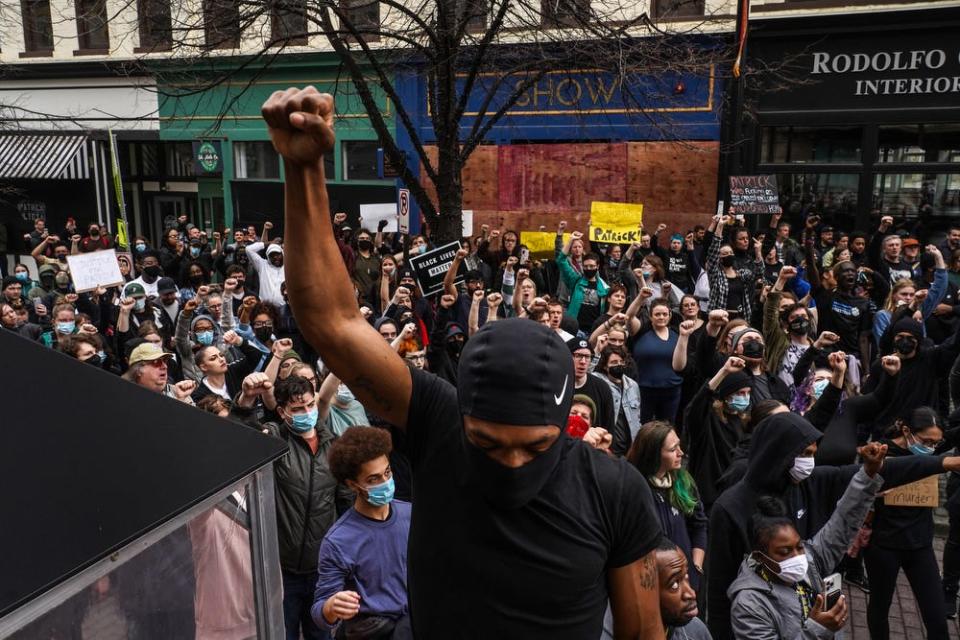Michigan Democrats vowed to take on policing bills. So far, they haven't.
- Oops!Something went wrong.Please try again later.
- Oops!Something went wrong.Please try again later.
- Oops!Something went wrong.Please try again later.
- Oops!Something went wrong.Please try again later.
Days after police in Memphis released footage of the brutal beating of Tyre Nichols, a 29-year-old Black man who died after being beaten by a group of Memphis police officers, a group of Democratic lawmakers vowed to pass a series of police accountability measures that had been introduced in previous sessions but stalled under Republican leadership.
"These will be re-introductions," said Sen. Sarah Anthony, D-Lansing, during a Jan. 31 press conference. "Make no mistake, the men and the women behind me who are both in the Michigan Legislative Black Caucus and are allies and supporters have introduced bill after bill after bill after bill. And with Republicans in the majority, nothing moved."
In previous sessions, when they were in the minority, Democrats sponsored legislation to, among many items, ban the use of no-knock warrants, increase training standards for de-escalation methods, require officers to intervene when they see another using excessive force and ensure that use-of-force violations would be included in an officer’s record if transferring to another agency.
This year they had a newly minted Democratic trifecta on their side, and it moved quickly to check off a litany of policy goals, repealing Michigan’s right-to-work law, passing a series of gun safety measures, expanding abortion access and more. But by the end of the year, the Democrats' policing proposals had seen even less action than under Republican leadership. No bills were introduced.
“I was ready to go that day,” Anthony said, referencing the January press conference in a November interview with the Free Press. “In terms of introducing legislation, there's so many bills that are really low-hanging fruit that we could be introducing and working through the process. Every day that we don't act, I think we're disappointing our stakeholders who have been lifting up these issues, particularly during 2020 with the murder of George Floyd. In order to prevent the next crisis, we have to prioritize this next year.”
Work has taken place to re-introduce the legislation, Democratic lawmakers say. But they're also cognizant of razor-thin majorities in each chamber last year and now, an even split between parties in the House until two seats can be filled in April special elections.
“It’s an issue that is important for a lot of lawmakers and important for a lot of community members, and also has the support of a lot of law enforcement officials,” said Sen. Stephanie Chang, D-Detroit. “At the same time, we recognize that building support for the bills is really important among our colleagues in the Legislature.”
Chang, who chairs the Senate Committee on Civil Rights, Judiciary, and Public Safety, sponsored policing bills in past sessions.
Sen. Erika Geiss, D-Taylor, chairs the Michigan Legislative Black Caucus. She said the package is necessary to improve community safety, not only for residents but also for law enforcement officers who desire consistent policies while working.
“This is a package that would be transformational,” Geiss said. “Work has continued throughout the year on it. And I'm hopeful that we'll be able to get something done when we return in January. There were so many things that we were able to get done in 2023. And it's disappointing that this was not one of them.”
Supporters see missed opportunity not advancing policing bills in 2023
Some Democratic lawmakers are frustrated with the lack of movement over the policing bills, given the amount of support for codifying some law enforcement standards from community advocacy groups who have repeatedly called for change.
“There's definitely urgency from the people that I represent,” said Rep. Kristian Grant, D-Grand Rapids.
Grant’s district covers the southeast side of Grand Rapids, where Patrick Lyoya, a Congolese refugee, was shot and killed by a police officer during a struggle that ensued after he tried to flee a traffic stop. The officer was charged with murder, but not before footage of the shooting sparked protests and calls for change in Grand Rapids. Similarly, calls for change took place nationwide and in Michigan after the murder of George Floyd by a Minneapolis police officer in 2020, as well as the fatal shooting of Breonna Taylor in Louisville that year during a no-knock raid.

“The part that breaks my heart, there's a piece from the people that I represent. (They) also said, ‘we want this, but we don't even know if it ever will really happen, we don't know if we ever even really expected it,’” Grant said. “When we have a (Democratic) trifecta, the people who have supported us for the longest should not be the last ones to see the good effects.”
Not passing this legislation under a Democratic majority would be a major disappointment, said Teferi Brent, who chairs the Community Safety Committee of the Black Leadership Advisory Council formed by Gov. Gretchen Whitmer in 2020.
“I would hate for us to get to the point in order for us to have serious police reform, criminal justice reform, that we wait until somebody else gets killed,” he said. “We have an opportunity to protect citizens and police, and we have to do that."
"Ultimately as far as the Democratic Party in the state of Michigan, they need to be behind this. They need to push this. They need to understand that this is important to Michiganders, especially to African Americans."
Previous efforts to pass policing legislation stalled, and bills not even being introduced in 2023 is worrisome, Brent said.
While lawmakers haven't made policy movement, Anthony, who chairs the Senate Appropriations Committee, pointed to funding for law enforcement training included in the state's budget for the current fiscal year.
Included in the state budget were millions of dollars for police officer training, including $10 million for the Michigan State Police Training Academy "to support realistic, multi-disciplinary training opportunities for law enforcement agencies across the state," according to the governor's office.
"We've put money and resources into the budget to make sure that we're uplifting law enforcement," Anthony said. She pointed to the policies previously introduced as "simple things" lawmakers can pass to provide "guardrails and provisions to make sure everyone gets home safe," civilians and officers alike.
Bill proponents believe measures have enough support to overcome any political framing
In previous sessions, Democratic lawmakers attributed a lack of movement on policing legislation to political machinations — in 2020, a bipartisan package of bills stalled in the Senate, as the presidential election that year took the steam out of calls for change. Bills were again introduced in the next session on May 25, 2021, the first anniversary of Floyd’s murder, but weren’t voted on before the session wrapped up at the end of 2022.
Still, political concerns may have slowed momentum for getting the measures passed. Josh Pasek, a professor of communication and media and political science at the University of Michigan, previously told the Free Press that bills dealing with law enforcement are often scrutinized as being “anti-police,” creating a challenge for Democratic candidates representing or running in competitive districts.
Like Chang, Grant said it’s important for lawmakers to make sure the policing bills, which supporters are referring to as police improvement bills, have broad support in both chambers. Grant noted that in the 2022 election, Democrats were able to win swing House districts that gave them the majority this year, and those close seats will likely be heavily targeted by Republicans in 2024.
“I think that we had so much that had to happen in this first year,” Grant said. “We have to expand this majority so (things aren’t) walked back. I still think there's hope in this session, but I think that was a lot of leadership's hesitancy in the first year. I've had multiple conversations with them, though. And I do believe that there's some possibility for some movement.”
Ultimately, it's House and Senate leadership that decides which legislation gets prioritized.
A spokesperson for House Speaker Joe Tate, D-Detroit, didn’t respond to a request for comment for this story. Tate was among the lawmakers who spoke at the January press conference, saying "I'm committed to working with my colleagues, community members, leaders in law enforcement, anyone and everyone who is willing to ensure the safety and peace of mind of all Michiganders."
A spokesperson for Senate Majority Leader Winnie Brinks, D-Grand Rapids, declined to comment for this story, though Anthony said, "we do have commitment from our leadership that we will be taking some of these proposals up."
In the past, Whitmer and Lt. Gov. Garlin Gilchrist II have voiced support for certain police accountability measures. Asked about the proposals during a recent scrum with reporters, Whitmer said, “it’s important that we do take some action and I’m hopeful that we can next year.”
Bill proponents note that polling shows there is broad support for many of the measures previously proposed in Michigan.
“Politics matters in deciding how we move forward, in terms of the strategy around moving these police improvement bills. But I think that was very clear to me from the polling, and from talking to a lot of different folks is that the majority of Michiganders support addressing no-knock warrants,” Chang said. “What we're talking about are issues that are actually not very controversial when it comes to responsible policing and training.”

In addition to some of the proposed measures polling well, Brent noted several police departments in Michigan have already started adopting some of the policies touted by lawmakers — the Detroit Police Department has a formal Duty to Intervene policy (although through a directive that’s set for reevaluation at the end of the year) and Lansing police announced a ban on no-knock warrants in 2020, for example. But a lack of uniformity among law enforcement agencies still places individuals at risk when certain policies aren’t in place, Brent said.
“Law enforcement in this country is one of the few institutions where you have absolutely no standardization, there's far too much discretion,” Brent said. “You really want policies in place that minimize negative interactions between police and citizens.”
Brent echoed lawmakers in saying legislative changes are needed to make communities safer for both citizens and police officers, particularly pointing out how raids executed through no-knock warrants can create dangerous scenarios.
The Michigan State Coalition of the NAACP also adopted a resolution in September calling on lawmakers to pass policing legislation. The resolution, which says the policies would make communities safer for both citizens and police officers, also states Michigan “has an opportunity to enact reforms that will help keep our communities and police officers safe by improving both officer policies and reshaping the way in which we train our officers.”
Lawmakers say they are working to ensure that unlike in previous sessions, the bills can actually go beyond being introduced and actually pass next year.
“For many of us lawmakers, this is one of our top priorities,” Chang said. “We are working extremely hard to build the support that's needed in the Legislature to pass these bills.”
Free Press staff writer Clara Hendrickson contributed to this article.
Contact Arpan Lobo: alobo@freepress.com. Follow him on X (Twitter) @arpanlobo.
This article originally appeared on Detroit Free Press: Michigan Democrats yet to introduce previously backed policing bills

